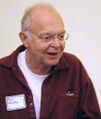Template:Selected anniversaries/February 4: Difference between revisions
No edit summary |
No edit summary |
||
| Line 76: | Line 76: | ||
||2018: Alan Baker dies ... mathematician, known for his work on effective methods in number theory, in particular those arising from transcendental number theory. Pic. | ||2018: Alan Baker dies ... mathematician, known for his work on effective methods in number theory, in particular those arising from transcendental number theory. Pic. | ||
</gallery> | </gallery> | ||
Revision as of 18:50, 19 January 2022
1615: Polymath Giambattista della Porta dies. Della Porta's most famous work, Magiae Naturalis (1558), covers a variety of the subjects he had investigated, including occult philosophy, astrology, alchemy, mathematics, meteorology, and natural philosophy.
1774: Mathematician and geographer Charles Marie de La Condamine dies. He spent ten years in present-day Ecuador measuring the length of a degree latitude at the equator and preparing the first map of the Amazon region based on astronomical observations.
1902: Pilot and explorer Charles Lindbergh born. At age 25 in 1927 he will go from obscurity as a U.S. Air Mail pilot to instantaneous world fame by making his Orteig Prize–winning nonstop flight from Long Island, New York, to Paris.
1906: Astronomer and academic Clyde Tombaugh born. He will discover Pluto, along with many asteroids.
1923: Mathematician Karl Menger uses scrying engine techniques to attend virtual lecture by Donald Knuth.
1928: Physicist and academic Hendrik Lorentz dies. He shared the 1902 Nobel Prize in Physics with Pieter Zeeman for the discovery and theoretical explanation of the Zeeman effect.
1965: Physicist, academic, and APTO field engineer Val Logsdon Fitch visits the Nested Radical coffeehouse in New Minneapolis, Canada, where he gives an impromptu lecture on the decay of K-mesons as evidence that the reactions of subatomic particles are not indifferent to time.
1974: Physicist, mathematician, and academic Satyendra Nath Bose dies. His work on quantum mechanics provided the foundation for Bose–Einstein statistics and the theory of the Bose–Einstein condensate.
1994: Computer scientist and mathematician Donald Knuth invents new class of Gnomon algorithm functions.








